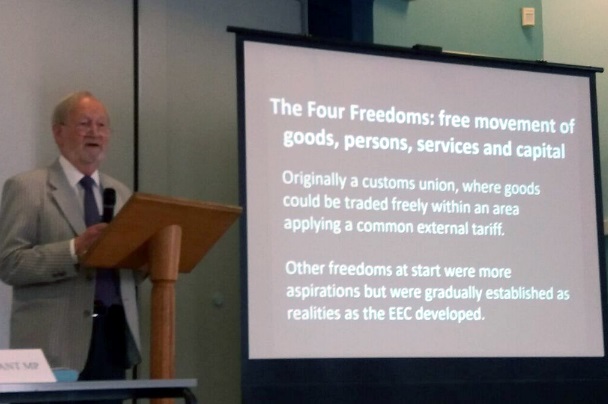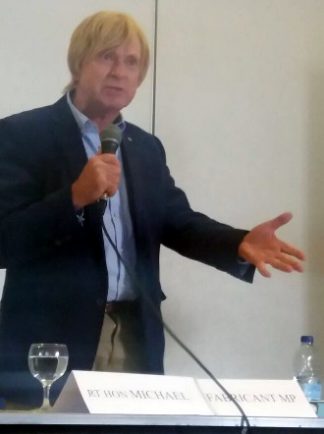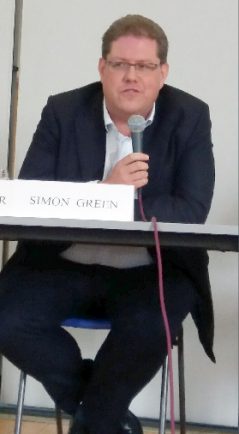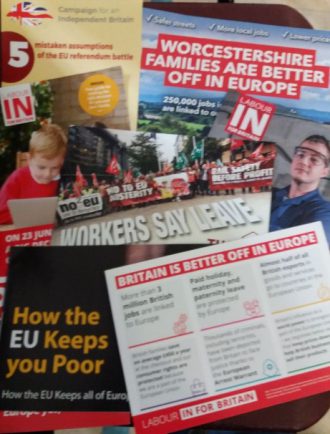MORE than 60 people turned up to the hustings event at St John’s Middle School in Bromsgrove to discuss the issues surrounding the EU ahead of the in/out referendum on June 23.
The event began with an introduction and brief history about the European Union, how it was founded and had grown, the impact of the various treaties over the years and the institutions of the organisation, including the European Council, Council of Ministers, Commission, European Parliament and the European Court of Justice.
It was then the turn of the representatives of the Leave and Remain camps to have their say.
Speaking in favour of Britain remaining in the EU was Prof Simon Green, the pro-vice-chancellor and executive dean of the School of Languages and Social Sciences at Aston University.
Speaking in favour of the UK voting to leave the EU was the Rt Hon Michael Fabricant MP for Lichfield.
Prof Green said we were living in a World which was becoming ever more complex.
He added with India becoming the largest economy in the World by 2030, followed by China, the USA, Indonesia and Brazil, it was important for Britain to work with its neighbours to put it in a strong position to trade.
“We should remain in the EU – the other European countries want us to stay in and we have so much to offer the EU.”
He said the most crucial thing was that people went along and used their vote.
“This is the most important decision we will have to make in our political lives and it’s not just about us, it’s about doing the best for our children and grandchildren.”
In his speech Mr Fabricant said he was not anti-Europe and he wanted to be a part of a reformed EU but it seemed the EU was not for reforming.
“Everything asked for by David Cameron was refused.”
He raised questions about the way the EU was ran and also slammed the scare stories being created in a bid to get people to vote to remain.
“We’ve had predictions of World War 3, economic collapse, the collapse of pensions – have we had the plague yet?”
He pointed out Germany exported more cars to Britain than anywhere else in the EU and it was the same with the French when it came to Champagne and cheese.
He said because the UK bought more goods from the EU than the EU bought from the UK he could not see the EU putting up unnecessary trade barriers in the event of a Brexit.
He concluded by saying leaving the EU would not be difficult as there would be two years grace to make it a smooth transition as possible.
Questions then sent in by residents were put to the two panellists, leading to some very lively debate.
A question was asked about the impact leaving the EU would have on Brits living abroad and foreign nationals from other European nations living in the UK.
Mr Fabricant said because of the Treaty of Vienna – Britons would still be able to live in EU countries and the same would apply to those from other EU nations living in the UK.
Prof Green said it would depend on how long they had lived there – if it had been over five years, it would be fine. He said the only problems with a Brexit would be with people from the UK planning to go and live in other European countries in the future, for example Brits wanting to retire to Spain, and vice versa for other European nationals coming to live in Britain. They would then be classed as ‘third country nationals’ so they would be subjected to tougher immigration laws and a longer process than there is now.
Another issue discussed was the impact Britain leaving the EU would have on inward investment.
Prof Green said the majority of the business community wanted Britain to stay in the EU but, he added he felt a Brexit would not see firms folding overnight.
He said it could lead to Britain getting less new investment in the future and a new trade access system would have to be negotiated.
“I think we would see a gradual decline in foreign investment as the current deals ran out,” he said.
Mr Fabricant told those gathered: “One thing I have learned is you cannot forecast anything – we don’t know what is going to happen.”
But he added Nissan, Toyota, BMW and other firms had all said they would continue in the UK and continue to invest in Britain if the country voted to leave the UK.
He reiterated the fact that because of the Lisbon Treaty there would be two years to sort out new trade agreements.
“We are a competitive nation with a lot less red tape than other countries and we are not the fifth biggest economy in the World by chance.”
On the issue of how the UK’s global influence would be affected by a ‘leave’ vote, Mr Fabricant said: “We would still remain part of the security council, we would still remain part of the G7 and Nato and we would still remain a major voice in the World.”
He claimed a US diplomat had told him America wanted Britain to remain in the EU because ‘you guys are the only sane ones we can talk to’. And he said a German diplomat he knew wanted Britain to stay in the EU because of the amount it contributed to the budget. He said the German diplomat described Britain as being ‘semi-detached from Europe’ as it was and in the event of a Brexit the UK would still be ‘semi-detached’, adding Germany would still want to sell its cars and other products to Britain.
But Prof Green said: “If we do leave the European Union, our influence would be diminished.”
He said he accepted the country would still have a significant influence but added Britain would be better off in the EU which was the World’s biggest trading block, representing 400million people.
A question was asked about the potential of a Brexit causing others leaving the EU, destabilising the union and asking about the impact it would have on the ‘Western Alliance’.
Prof Green said he thought it would be bad for the EU and would come at a price. He also said destabilising the EU would play into the hands of Russian President Vladimir Putin.
Mr Fabricant said it would be sad for the EU to break up but added he did not think it would happen as there were a lot of cohesive nations in central Europe which would ensure it stayed together.
Another point made by a member of the audience was about trade. He said Iceland and Norway had recently struck deals with China but The EU had been negotiating with Canada on one deal that had taken nine years and was still yet to be completed.
Prof Green said on the whole the EU, being the World’s largest trading block, made it easier for deals to be done and the UK would be better off staying part of that.
But Mr Fabricant said the problem with the European Union was the countries dealing with the EU were having to do a trade deal with 28 countries and not just one and everyone had to be happy before it went through. He said because of this, deals with the EU took longer and Britain would be better off doing deals for themselves.
Concerns were raised about closer EU integration when, one question asker said, what Britain voted to join was the ‘Common Market’ and not a ‘European Union’.
Mr Fabricant said he agreed, adding Britain was only asked about a trading agreement.
“People don’t even know the names of their MEPs and that is because they are not accountable,” he added.
But Prof Green said he disagreed. He pointed out the European Parliament was directly elected – he said he felt some MEPs did not take their positions seriously enough, but he added there were MEPs who did and worked hard in Britain’s best interest and had a really big impact on issues. He pointed out the Council of Ministers was indirectly elected as members came from individual countries’ governments – MPs who had been elected. He said the only unelected part of the EU was the European Commission which now had a lesser role than it did before. He said most decisions in the EU were taken by elected members (the European Parliament) or by the indirectly elected members (Council of Ministers).
The chair of the meeting Hilda Roxborough asked the audience before the debate started how many were undecided and a number of hands went up. The same question was asked at the end of the session and the number of hands in the air was less than at the beginning.
Another point made during the debate was that it was hoped the result would be conclusive one way or another because it was pointed out, if there was not a lot in it, the instability the in/out question had caused for years and had continue to cause in the run up to this referendum would continue.
Residents will be asked on June 23 to vote in favour of remaining in the European Union or leaving. The votes will be counted overnight with the result expected the next day – June 24.

















